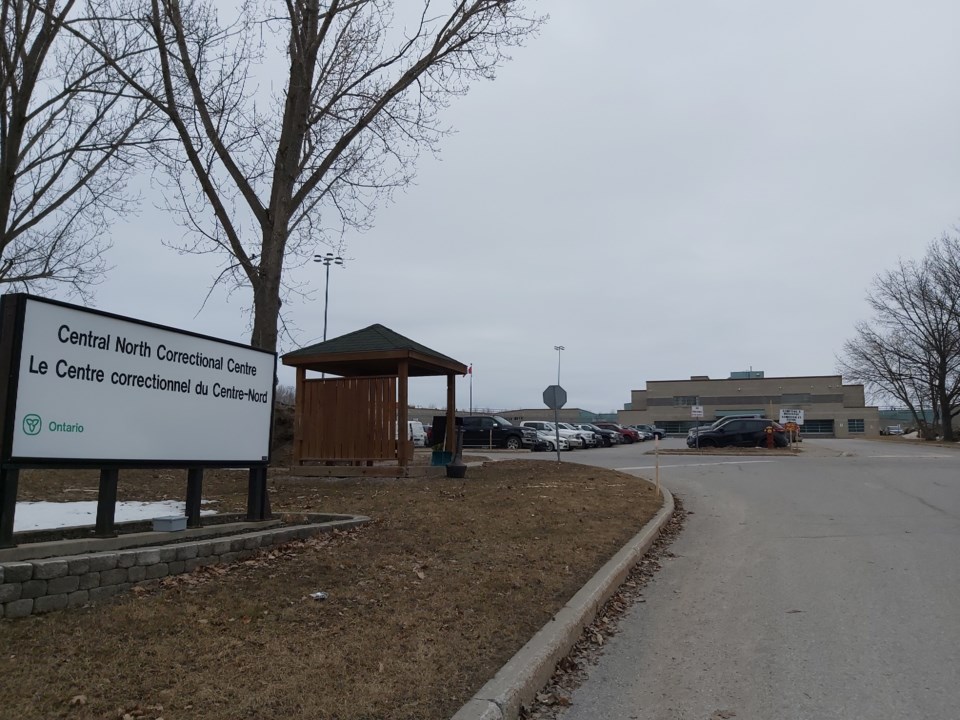UPDATE 6 p.m. Wednesday
Comments from Brent Ross, Ministry of the Solicitor General spokesperson.
Due to our proactive work to lower the number of inmates within our institutions, all provincial correctional institutions are within operational capacity, and we have vastly reduced the need for the transfer of inmates between institutions. We anticipate the number of inmates in custody will continue to decrease over the coming weeks as we continue to provide early release to non-violent inmates near the end of their sentences who qualify for temporary absence permits.
Inmate transfers to institutions closer to their home communities will continue.
ORIGINAL STORY from Wednesday morning below
Central North Correctional Centre (CNCC) union president Richard Dionne wants the province to treat every jail like a cruise ship where no one gets out at port.
Dionne said while there are currently no confirmed cases at the superjail in Penetanguishene, it doesn't mean the whole system isn't a petri dish for infectious diseases. Following government protocol, he said he and some of his peers, who have recently returned from vacations or have been in contact with others who may have exhibited symptoms, are in self-quarantine.
Dionne said his main concern is unnecessary inmate transfers during the pandemic. Those concerns were heightened after reports surfaced Monday that three staff members at the Toronto South Detention Centre had tested positive for COVID-19.
"They're unnecessarily moving inmates around the province. That just hasn't stopped," Dionne said, noting there are various reasons behind these kinds of transfers.
"A lot of it is accommodation-type stuff. A small jail like North Bay may be near capacity and they don't want to triple bunk. I can appreciate that, but we're getting some individuals who are from jails that are not near capacity. And that's problematic."
Additionally, Dionne said arrests being made in the current environment means the virus could arrive at the jail from a new inmate.
"We don't know if they've been in contact with someone somewhere," he said, adding people don't need to exhibit symptoms to be able to give someone else the virus, they can be asymptomatic and still transmit it.
For such cases, Dionne said, the nursing staff at the CNCC have done a great job.
"They're doing full assessments and asking a number of COVID-19-related questions: if they have a fever, if they have a cough, if they've been in contact with someone who had symptoms," he said, adding the number of tests made available by the government are limited.
"Do we have to test every new admit? Probably not," said Dionne. "Because what do we do with them then? We're limited on segregation units. We can't leave guys housed individually for 14 days."
Dionne said the second problem relates to the release of inmates scheduled over the next few weeks since the Community Safety and Correctional Services ministry policy involves releasing individuals in their home community by midnight on the day of the release.
"For someone who is from Kenora, we can't release them in Penetang today and have them in Kenora by midnight," he said. "That doesn't work. The ministry is sort of using that as their scapegoat to continue transfers."
The solution, Dionne said, is already in motion.
"The deputy minister put some stuff out giving the superintendent power to give temporary absence passes to intermittent inmates 'til the end of their sentences," he said. "Typically, the superintendent has the ability to release someone a couple days earlier, say around Christmas time, so they can do this now, too."
Ministry officials did not return requests for comment, but Dionne said it's imperative that the ministry stops the transfers immediately.
"If that means you have to release an individual earlier, then that can be done," he added. "We're in a pandemic. We have to do what we have to do. The ministry is taking some steps, but I don't think they're taking all necessary steps."
And this has created a high-stress time for correctional officers, according to Dionne.
A lot of staff have concerns, not only for themselves, but for bringing it home," he said. "We have a very young workforce. There are kids at home. The concern isn't only, 'What if I get it? Also, what if I bring it back to my kids?'"
He said the mental health of correctional officers seems to have moved to the back-burner.
"I don't even think that's a thought at this point for the employer," he said. "Could it be a benefit? For sure. Because there are some people struggling with the stress and anxiety of it all.
"(Premier Doug) Ford in his press conference two days ago said that the minister is in daily contact in speaking with the frontline --- I call bullshit. It's my opinion that the ministry is not listening to us. It's very apparent. We've said it a number of times that those closest to the problem are closest to the solution. And we're trying to prevent it from getting into the jails and spreading. But they're not listening to us."
